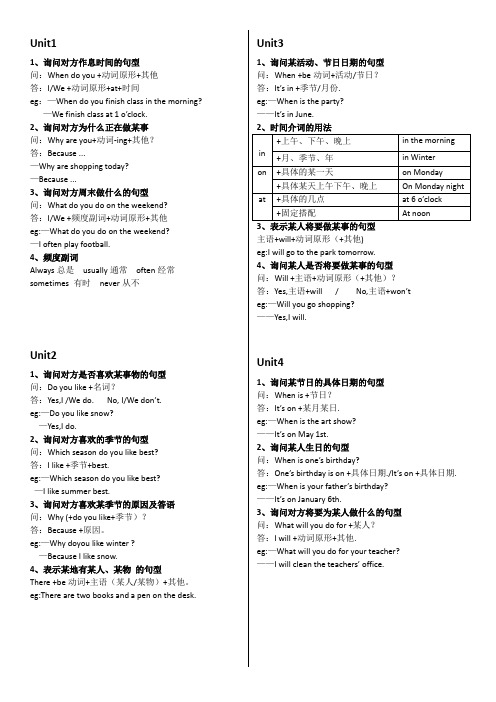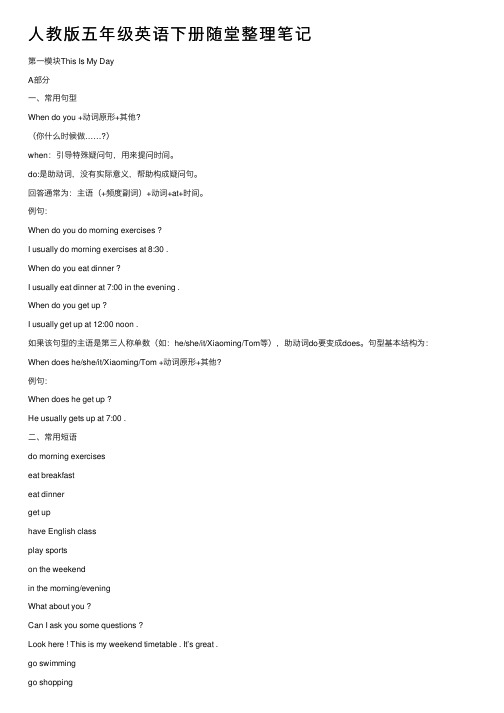人教版五年级下册英语知识点整理
人教版小学五年级英语下册知识点汇总(完整版)

Unit1 My day 知识点总结一、语音cl — [cl] : clean classpl — [pl] : eggplant茄子 please play注意:cl 和 pl 放在词尾与 e 结合变为cle 和 ple 时发音不同.如people,apple。
二、词汇1、日常活动词汇do morning exercises(做早操)eat breakfast/lunch/dinner(吃早餐/午餐/晚餐)have...class(上…课)take a dancing class(上舞蹈课)play sports(做运动)go for a walk (散步)clean my room(打扫我的房间)go shopping(购物)2、其他词汇exercise 活动;运动 take学习;上(课)dancing跳舞;舞蹈when什么时候;何时 after在(时间)后 start开始(反义对应词finish完成)usually 通常地;惯常地 Spain 西班牙 late 晚;迟(反义对应词early早)why 为什么 a.m.午前;上午 p.m.午后;下午 shop去买东西;购物work 工作 last上一个的;刚过去的 sound听起来好像also 还;也busy 忙的need 需要play 戏剧剧本 letter 信Live 居住island 岛always 总是;一直 cave 山洞;洞穴go swimming 去游泳win 获胜。
三、句型以及语法知识点1、询问别人什么时候做某事某种活动的when特殊疑问句型,使用时间短语回答。
When do you do morning exercises? 你何时做早操?I do morning exercises at 7:00.我七点钟做早操。
When do you finish class in the morning? 你们上午的课到什么时候结束?We finish class at 1 o’clock.我们一点钟结束上午的课。
人教版小学五年级下册英语知识点整理

Unit11、询问对方作息时间的句型问:When do you +动词原形+其他答:I/We +动词原形+at+时间eg:—When do you finish class in the morning?—We finish class at 1 o’clock.2、询问对方为什么正在做某事问:Why are you+动词-ing+其他?答:Because ...—Why are shopping today?—Because ...3、询问对方周末做什么的句型问:What do you do on the weekend?答:I/We +频度副词+动词原形+其他eg:—What do you do on the weekend?—I often play football.4、频度副词Always总是usually通常often经常sometimes 有时never从不Unit21、询问对方是否喜欢某事物的句型问:Do you like +名词?答:Yes,I /We do. No, I/We don’t. eg:—Do you like snow?—Yes,I do.2、询问对方喜欢的季节的句型问:Which season do you like best?答:I like +季节+best.eg:—Which season do you like best?—I like summer best.3、询问对方喜欢某季节的原因及答语问:Why (+do you like+季节)?答:Because +原因。
eg:—Why doyou like winter ?—Because I like snow.4、表示某地有某人、某物的句型There +be动词+主语(某人/某物)+其他。
eg:There are two books and a pen on the desk.Unit31、询问某活动、节日日期的句型问:When +be动词+活动/节日?答:It’s in +季节/月份.eg:—When is the party?——It’s in June.主语+will+动词原形(+其他)eg:I will go to the park tomorrow.4、询问某人是否将要做某事的句型问:Will +主语+动词原形(+其他)?答:Yes,主语+will / No,主语+won’t eg:—Will you go shopping?——Yes,I will.Unit41、询问某节日的具体日期的句型问:When is +节日?答:It’s on +某月某日.eg:—When is the art show?——It’s on May 1st.2、询问某人生日的句型问:When is one’s birthday?答:One’s birthday is on +具体日期./It’s on +具体日期. eg:—When is your father’s birthday?——It’s on January 6th.3、询问对方将要为某人做什么的句型问:What will you do for +某人?答:I will +动词原形+其他.eg:—What will you do for your teacher?——I will clean the teachers’ office.1、描述物品归属的句型物品+ be动词(is/are)+(mine/his/hers/yours/ours/theirs) eg:The book is yours.2、确认物品归属地句型问:be动词+this/that/these/those(+其他)+某人的?答:Yes,it is. Yes,they are./ No,it,is’t. No,they aren’t. eg:—Is that crayou his?——Yes,it is.3、询问物品归属的句型问:单数Whose+is it/this/that?复数Whose+are they/these/those?答:It’s/They’re+名词性物主代词/ 名词所有格eg:—Whose bag is this?——It’s mine.4、现在进行时的一般疑问句问:Be动词+主语+动词-ing(+其他)?答:Yes,主语+be动词/ No,主语+be动词+not. eg:—Is she listening to music?——Yes,she is.5、描述某人正在做某事主语+be动词(am/is/are)+动词-ing(+其他).eg:I’m doing my homework now.6、询问某人能否做某事问:Can+主语+动词原形+其他?答:Yes,主语+can. /No,主语+can’t.eg:—Can I play football?——Yes,you can.Unit61、询问多个人或动物正在做什么的句型问:What are +主语(复数)+doing?答:主语(复数)+are+动词-ing+其他.eg:—What are the boys doing?——They are jumping2、询问单个人或动物正在做什么的句型问:What is +主语(单数)+doing?答:主语(单数)+is+动词-ing+其他.eg:—What is Tom doing?——He is playing football.。
(完整版)人教版五年级英语下册Unit1知识点汇总

Unit1 My day 知识整理△话题:谈论每天的活动及时间安排△词汇:do morning exercises(做早操)eat breakfast/lunch/dinner(吃早餐/午餐/晚餐)have...class(上…课),play sports(做运动)clean my room(打扫我的房间),go for a walk (散步) go shopping(购物),take a dancing class(上舞蹈课)△拓展词汇:get up(起床), go to bed(上床睡觉)wash my clothes(洗我的衣服), watch TV(看电视)do homework(做作业), play music(演奏音乐)cook dinner(煮晚餐), at home(在家)in the morning(在上午),in the afternoon(在下午)in the evening(在晚上),at night(在半夜)△句型:①询问做某事在几点When do you+动词原形(短语)+其他?—— At +时间—— I(+频度副词)+动词原形(短语)+at+时间。
例句:When do you get up in the morning?—— At 7:30.—— I often get up at 7:30.②询问周末的活动安排What do you often do on the weekend?I often (always/sometime/usually) +…(周末的活动)+with … (某人)+on the weekend (on Saturdays/on Sundays ).例句:What do you do on the weekend ?I often take a dancing class with my friend on Sundays. △知识点:1:注意介词的搭配at +具体时间(几点)/night/home at 9 o ’clock in +国家/季节 in Spainon +星期 on the weekend/on Sundays with +人 with my father/mother/friend 2:表示时间频率词的区别always 表示总是,一直;usually 表示经常,通常;often 表示经常,常常;sometimes 表示有时,间或。
最全最新人教版五年级英语下册知识点-五年级下册英语口诀

最全最新人教版五年级英语下册知识点-五年级下册英语口诀Unit 1 My day一、重点词汇。
1. 四会词汇:eat breakfast吃早饭have ·c·lass 上·课play sports 进行体育运动exercise 活动;运动do morning exercises 做早操eat dinner 吃晚饭clean my room 打扫我的房间go for a walk 散步go shopping 去买东西;购物take学习;上(课)dancing跳舞;舞蹈take a dancing class 上舞蹈课2. 三会词汇:when 什么时候after 在(时间)后start 开始usually 通常地;惯常地Spain 西班牙late 晚;迟a.m. 午前;上午p.m. 午后;下午why 为什么shop 去买东西;购物work 工作last 上一个的;刚过去的sound 听起来好像also 还;也busy 忙的need 需要play 戏剧;剧本letter 信live 居住island 岛always 总是;一直cave 山洞;洞穴go swimming 去游泳win 获胜二、其他日常活动。
get up 起床eat lunch吃午饭go to bed上床睡觉wash my face 洗脸wash my clothes 洗我的衣服watch TV 看电视play ping-pong 打乒乓球playthe pipa 弹琵琶go swimming 去游泳go running 去跑步do homework 做作业do kung fu 练武术play football 踢足球play basketball打篮球三、频度副词。
always总是,一直(100%)usually通常(80%)often 经常(60%)sometimes(30%)有时四、疑问词。
when 什么时候why 为什么五、重点句型。
人教版五年级英语下册 知识点总结

Unit 1 This Is My Day对话一:A: When do you get up ? 你什么时候起床啊?B: I usually get up at 6:30.When do you eat breakfast?A: At 6:20. What about you? / And you? 你呢?B: I usually eat breakfast at 7:00.对话二:A: Excuse me .Can I ask you some questions ? 打扰了,我能问你几个问题吗?B: Sure.A: What do you do ? 你是做什么的?B: I am a policeman .A: When do you go to work ? 你什么时候去上班?B: I usually go to work at 9:00 in the evening.A: When do you go home ?B: I go home at 5:00 in the morning .A: Thank you for telling me about your day.谢谢你告诉我你的一天。
B: You’re welcome.对话三:A: What do you do on the weekend ? 你周末干什么呀?B: Usually I watch TV and go shopping. Sometimes I visit my grandparents.What about you ? 我通常看电视和购物。
有时候去拜访我的祖父母。
你呢?A: I often play football . Sometimes I go hiking .B: That’s fun .好玩句型:1、询问某人的生活,学习规律——when do you +动词(短语)——I(usually)+动词(短语)+at + 时间.2、Excuse me . 用在打扰别人时的一种客气说法,意为:打扰了。
新人教版PEP 【小学五年级英语下册】 单元知识点 归纳总结

新人教版PEP 【小学五年级英语下册】单元知识点归纳总结Unit 1 My DayIn this unit。
we learn some core vocabulary words。
phrases。
and XXX.Core Vocabulary:1.Verbs: take (studying)。
go to (class)2.Nouns: dancing。
exercise。
sports3.Phrases: do morning exercises。
eat breakfast。
play sports。
eat dinner。
go for a walk。
go shopping。
clean my room。
take a dancing class。
have a classXXX Vocabulary:1.Verbs: start。
shop。
work。
need。
live。
win。
sound2.Nouns: Spain。
play。
letter。
island。
cave3.ns: after4.XXX: when。
XXX。
a.m。
p.m。
why。
last。
also。
busy5.nal Vocabulary: frequency adverbs (always。
usually。
sometimes)Phrases:watch TV。
eat lunch。
go to bed。
go swimming。
go home。
go to schoolCore Sentence Structure:When do you do morning exercises?" "At 7 o'clock."XXX phrase is "good job" to praise XXX.Which season do you like best。
I like winter best。
This sentence means "which one do you like the most" and "like。
人教版五年级英语下册随堂整理笔记

⼈教版五年级英语下册随堂整理笔记第⼀模块This Is My DayA部分⼀、常⽤句型When do you +动词原形+其他?(你什么时候做……?)when:引导特殊疑问句,⽤来提问时间。
do:是助动词,没有实际意义,帮助构成疑问句。
回答通常为:主语(+频度副词)+动词+at+时间。
例句:When do you do morning exercises ?I usually do morning exercises at 8:30 .When do you eat dinner ?I usually eat dinner at 7:00 in the evening .When do you get up ?I usually get up at 12:00 noon .如果该句型的主语是第三⼈称单数(如:he/she/it/Xiaoming/Tom等),助动词do要变成does。
句型基本结构为:When does he/she/it/Xiaoming/Tom +动词原形+其他?例句:When does he get up ?He usually gets up at 7:00 .⼆、常⽤短语do morning exerciseseat breakfasteat dinnerget uphave English classplay sportson the weekendin the morning/eveningWhat about you ?Can I ask you some questions ?Look here ! This is my weekend timetable . It’s great .go to schoolgo to workgo to bedgo homeexcuse meI am sorry.Sometimes I climb mountains .play the pianovisit grandparentswatch videosWhat do you do ?Tell us about your day !Thank you for telling me about your day .You’re welcome .三、单词when usually often at about too day ask work evening noon tell policeman some sure四、⼀般现在时⼀般现在时表⽰现在经常发⽣的动作、⾏为或存在的状态等。
【口袋书】人教版PEP五年级下册英语 基础知识汇总

人教版PEP五年级下册基础知识汇总Unit 1 My day.重点单词:[四会]dancing 跳舞;舞蹈exercise 活动;运动take 学习;上(课)[三会]after 在(时间)后start 开始usually 通常地;惯常地Spain 西班牙late 晚;迟a.m.午前;上午p.m.午后;下午why 为什么shop 去买东西;购物work 工作last 上一个的;刚过去的sound 听起来好像also 还;也busy 忙的need 需要play 戏剧;剧本letter 信live 居住island 岛always 总是;一直cave 山洞;洞穴win 获胜重点短语:eat breakfast 吃早饭have … class 上…课play sports 进行体育运动do morning exercises 做早操eat dinner 吃晚饭clean my room 打扫我的房间go for a walk 散步go shopping 去买东西;购物take a dancing class 上舞蹈课go swimming 去游泳start class 开始上课last night 昨天晚上after lunch 午饭以后a lot of fun 许多乐趣live on an island 住在一座岛上be good at sports 擅长体育运动字母组合cl 发/kl/ 音:clean 打扫clock 钟class 课;班级clever 聪明的clock 钟字母组合pl 发/pl/ 音:plate 盘子;碟子eggplant 茄子please 请play 玩耍;戏剧重点句型:1.询问别人什么时候做某事的问句及回答:-- When do/does + 主语+ 动词(短语)原形(+ 其他)?-- 主语(+ 频度副词)+ 动词(短语)原形/ 第三人稀单数形式+ at + 具体时间/ At + 具体时间.-- When do you get up? 你什么时候起床?-- I get up at 5 o'clock. 我5点起床。
- 1、下载文档前请自行甄别文档内容的完整性,平台不提供额外的编辑、内容补充、找答案等附加服务。
- 2、"仅部分预览"的文档,不可在线预览部分如存在完整性等问题,可反馈申请退款(可完整预览的文档不适用该条件!)。
- 3、如文档侵犯您的权益,请联系客服反馈,我们会尽快为您处理(人工客服工作时间:9:00-18:30)。
五年级下册英语第一单元知识点整理1、主要单词和短语:1 do morning exercises 1晨练,做早操2 eat breakfast 2 吃早饭3 have English class 3上英语课4 eat dinner 4 吃晚饭5 play sports 5 进行体育活动6 eat lunch 6 吃午饭7 climb mountains 7 爬山8 go shopping 8购物,买东西9play the piano 9 弹钢琴10visit grandparents 10 看望(外)祖父母11 go hiking 11去远足二、主要句子:1When do you eat dinner? 1 你什么时候吃晚饭?2I eat dinner at 7:00 in the evening. 2我晚上七点吃晚饭。
3When do you get up? 3你什么时候起床?4I usually get up at 12:00 at noon. 4 我通常在中午12点起床。
5What do you do on the weekend? 5你在周末干什么?6Usually I watch TV and go shopping. 6 我通常看电视和购物。
7 I often play football. 7我经常踢足球。
8Sometimes I go hiking. 8有时候我去远足。
三、重要知识点同义词:eat breakfast-have breakfast , eat lunch-have lunch, eat dinner-have dinner play sports-do sports, usually-often复数形式:policeman- ____policewoman-_____现在分词:tell-telling第三人称单数:say-_____同义句:What do you do ? ---What are you? 你是干什么的?表示频度的副词:always 总是,一直;usually 通常,常常;often 经常;sometimes 有时候以复数形式出现的词组:visit grandparents ,plant trees介词后跟表示时间的词语时,表示在某年、某月、某个季节,某个时候(在上午,在下午,在晚上)用in;表示在某一天,在星期几用on,在具体的几点几分用at.too 和either的用法区别:too和either都是“也”的意思,但too用于肯定句,either用于否定句。
第二单元知识点整理一、主要单词和短语:1 season 1季节2 spring 2春天3 summer 3夏天4 fall 4秋天5 winter 5冬天6 swim 6游泳7 fly kites 7放风筝8 skate 8滑冰9 make a snowman 9堆雪人10 plant trees 10种树二、主要句子:1 Which season do you like best? 1你最喜欢哪个季节?2 I like winter best. 2我最喜欢冬天。
3Summer is good, but fall is my favourite season.3夏天是很好但是秋天是我最喜爱的4 Why do you like summer? 4你为什么喜欢夏天?5 Because I can swim in the lake. 5 因为我可以在湖里游泳。
6 Why do you like winter? 6你为什么喜欢冬天?7 Because I can sleep a long time. 7 因为我可以睡很长时间的觉。
三、知识点同义词:autumn-fall(秋天)三单:say-says ask-_____come-_____对应词:wake up-sleep ; go to bed-get up同义句:What's your favourite season?(你最喜欢的季节是什么?)----Which season do you like best?(你最喜欢哪个季节?)play with 玩雪,play in the snow在雪中玩, 如果在横线后面有the ,则选择in , 如果在横线后面没有the , 则选择with.?like后面不能直接跟动词。
如果需要跟动词或动词性词组时,则需在like后面加to. 如果不加to. 就要把后面的动词变成相应的动名词形式。
如:I like to swim ===I like swimming.当表示某地某个季节的天气情况时,要把季节放在前面,地点放在后面。
其结构为:What's the weather like in 季节in 地点?第三单元知识点整理一、主要单词:1January (Jan.)一月2February (Feb.)二月3March (Mar.)三月 4 April(Apr.)四月 5 May 五月6 June 六月7 July 七月8 August(Aug.)八月9September(Sept.)九月10 October(Oct.)十月11 November (Nov.)十一月12 December (Dec.)十二月二、主要句子1 When is your birthday? --It's in May. 1你的生日是什么时候在五月。
2.My birthday is in June. Uncle Bill's birthdayisin June, too. 2 我的生日在六月。
比尔叔叔的生日也在六月。
3. Is her birthday in June? --Yes 3 她的生日在六月吗?是的。
4.What's the date? --June 9th 4是几月几日?六月九日。
5. What's the date today? --June 9th 今天是几月几日?四月十日。
三、主要知识点:1、关于月份:(1)五月May , 六月June, 七月July,没有简写形式。
九月September 的简写形式是前四个字母加点Sept. 其他八个月的简写形式是前三个字母加点。
(2)无论是完全形式还是简写形式,表示12个月的单词的第一个字母都要大写。
2、关于基数词变序数词。
(1)一般情况下,直接在基数词后面加th. (one , two , three 除外)。
one-first , two-second , three-third .(2)以ve结尾的基数词,变ve为f, 再加th. 如:five-fifth , twelve-twelfth.(3)以t结尾的基数词,直接加h.如eight-eighth.(4)以不发音的字母e结尾的,丢掉不发音的字母e,再加th. 如nine-ninth.(5)以y结尾的整十数,在变为序数词时,将y变为ie, 再加th. 如twenty-twentieth .(6)20以上的两位数,变为序数词时,十位数不变,只将个位上的数变为序数词。
如:twenty-one----twenty-first , twenty-two-twenty-second , thirty-four-thirty-fourth .(7)序数词的简写形式为表示该词的阿拉伯数字加上该单词的最后两个字母,最后两个字母要变成上标格式。
如:first-1st , second-2nd , third-3rd , fourth-4th . twentieth-20th3. 在回答When is your birthday? 这个问题时,如果只说明生日在几月份,在月份前用in. 如My birthday is in July.如果要具体说明生日是在几月几日,则要把in去掉,直接用is,或者在is后加on.如My birthday is June 9th. 或My birthday is on June 9th .4.注意区分两个句子:What day is it today ? 今天星期几?What's the date today? 今天是几月几日?5. 根据要求写单词:make (现在分词)-----____. send(现在分词)-----____6.句子:How many birthdays are in October ? 有几个人的生日在十月?There are 3.7. My birthday is in February . (变为一般疑问句)---____________?8. Does she have a computer? 她有计算机吗?当第三人称单数和句子中出现了does时,其他动词必须使用原型。
9、读序数词时,前面一定要加the. 如October 1st .读作October the first.10、同义句:Who has a birthday in October?===Whose birthday is in Octob第四单元知识点整理一、主要单词:1 draw pictures 1 画画2 drawing pictures 2正在画画3do the dishes 3洗碗碟 4 doing the dishes 4正在洗碗5cook dinner 5做饭6cooking dinner 6正在做饭7 read a book 7读书8 reading a book 8正在读书9answer the phone 9接电话10answering the phone 10正在接电话11listen to music 11听音乐12listening to music 12正在听音乐13wash clothes 13洗衣服14 washing clothes 14正在洗衣15clean the room 15打扫房间16cleaning the room 16正在打扫房间17write a letter 17写信18writing a letter 18正在写信19 write an e-mail 19写电子邮件20writing an e-mail 20正在写电子邮件二、主要句子:1. This is Zhang Peng . 1(电话用语)我是张朋。
2 What are you doing? 2 你正在干什么?2a.I'm doing the dishes. 2a我正在洗碗碟。
2b I'm reading a book. 2b我正在读书。
3 Grandpa is writing a letter. 3爷爷正在写信。
